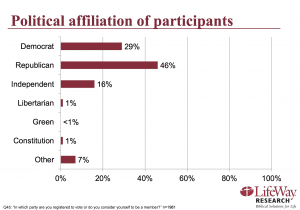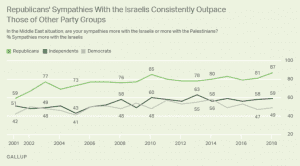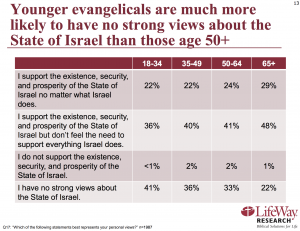Americans Overwhelmingly Support Israel; Do Evangelicals Play a Role?
“More than three out of four Americans with Evangelical beliefs agree that Christians should support the Jewish people’s right to live in the sovereign state of Israel.” – Scott McConnell
Speaking at the National Press Club this past December, Scott McConnell, Executive Director of LifeWay Research, introduced a new survey entitled, Evangelical Attitudes Toward Israel and the Peace Process. Sponsored by Chosen People Ministries and New York Times bestselling author Joel C. Rosenberg, the survey sheds light on American evangelicals’ changing attitudes toward Israel and their effect on the Church’s support of Israel and the peace process.
While the LifeWay survey comprehensively maps a more positive view of American Evangelical attitudes toward Israel, it does not represent American opinion at large. The survey does, however, share many similarities to a recent three-decade trend poll published by the Gallup organization on American sympathies toward Palestinians and Israelis.
Titled, American’s Remain Staunchly in Israel’s Corner, the Gallup Poll suggests that in general, the American public’s view of Israel is growing increasingly favorable in a manner similar to those of evangelicals.
The Gallup Poll asked participants one question: “In the Middle East situation, are your sympathies more with the Israelis or more with the Palestinians?” Reporting on the survey’s findings, Lydia Saad wrote:
“Currently, 74 percent of U.S adults view Israel favorably.”
In keeping with generally positive evangelical Christian views of the Jewish state, the overall American view of Israel appears to be quite similar, specifically when biblical beliefs and age are taken into consideration.
When compared to the Gallup survey, LifeWay’s research reveals a slightly lower level of “positive views towards Israel” at 69 percent. However, when framing the question through a biblical lens, LifeWay reports that 80 percent of Evangelicals believe, “When God promised Abraham and his descendants the land of Israel, the promise was for all time.” In both cases, the major factor impacting a favorable view towards Israel is biblical beliefs.
The Gallup poll also points out that Republican support for Israel has consistently been greater than Democratic support. At 87 percent, a record high, favorable Republican views of Israel is far greater then Democratic views which rest at 49 percent. This might be further explained by LifeWay’s research, which found that nearly 46 percent of the evangelical Christians surveyed are Republicans, while 29 percent identify as Democrats. The similarities suggest that evangelical Christians—80 percent of whom believe that the land of Israel was promised by God to the Jewish people—have a considerable voice in the Republican party and may influence the overall attitude toward Israel.


Americans identifying as Republicans in the Gallup Poll track with those who claim to be evangelical Christians in the LifeWay survey.
The second correlation found between the two surveys is age. LifeWay’s findings show that 18-49 year-old evangelical Christians are more likely to be unsure about their perception of Israel when compared to age groups 50 and older. Gallup’s responses resemble the Christian evangelical community in that Israel is viewed less favorably among 18-55 year-old Americans when compared to those 55 and older.

The youngest groups in both surveys, specifically millennials age 18-34, are the least likely to have either a positive or favorable view of Israel when compared to their parents’ and grandparents’ age groups.
While the findings are similar, the focus of the research is different. The Gallup Poll maps American public opinion and LifeWay looks at Evangelical attitudes toward Israel, its neighbors, the peace process, and its effect on the Church.
One area studied by both groups examines perceptions of Palestinians. The Gallup Poll suggests that nearly three out of four Americans sympathize with Israelis more than Palestinians. However, when LifeWay researchers asked if “Christians should do more to love and care for Palestinian people,” 59 percent of the Evangelicals agreed. Not surprisingly, the millennial age group made up the majority of those who agreed with the statement—nearly 66 percent.
While Americans in general view Israel favorably, the majority of evangelicals led by millennials also feel the need to care more for the Palestinian people. Gallop did not ask this question, however.
The results from both LifeWay and Gallup show that the majority of American evangelicals and those Gallup indicated were politically conservative support the nation of Israel. Biblical belief in the importance of Israel and the Jewish people serves as a key foundation upon which their support rests. Support for Israel is less common in younger age groups, specifically millennials. In summary, both surveys highlight a growing trend of Republican Americans and evangelical Christian support for Israel, but are unclear about whether future generations will follow in their footsteps.
Written by Zachariah H. Karp






